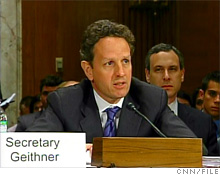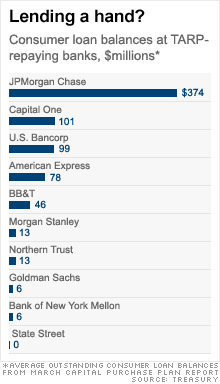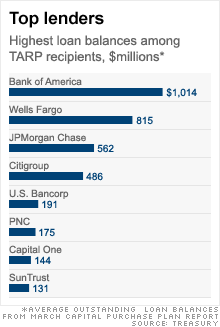TARP payback may not help consumers
Half of the big banks paying back federal loans are investment firms or asset managers, so lending isn't likely to pick up.
 |
| Tim Geithner says he wants banks to lend more. |


NEW YORK (Fortune) -- Don't expect TARP-free banks to unleash a torrent of loans to cash-strapped consumers.
The Treasury Department told ten big bank holding companies Tuesday that they are healthy enough to repay their federal loans. In turn, the big banks said they would repay $68 billion to Treasury's Troubled Asset Relief Program. JPMorgan Chase (JPM, Fortune 500) will be sending Treasury the biggest check, for $25 billion.
Treasury Secretary Tim Geithner told Congress that the planned repayments show the "very tangible benefits" of rescue plans such as TARP. Boosting bank lending is "the ultimate measure of the success" of Treasury's financial rescue programs, Geithner told the Senate Appropriations Committee Tuesday.
Still, by that measure, Treasury's efforts have a ways to go. While bank executives will surely enjoy being out from under the thumb of Congress, it's unlikely that freeing these banks from the strictures of TARP will bring as much of a surge in lending to consumers and small businesses as Geithner would like.
Two of the firms approved to repay loans -- Goldman Sachs (GS, Fortune 500) and Morgan Stanley (MS, Fortune 500) are primarily investment banks. State Street (STT, Fortune 500), Bank of New York Mellon (BK, Fortune 500) and Northern Trust (NTRS, Fortune 500) are asset managers that do little lending of any sort.
"You look at this list and you're not really talking about the big-time lenders, with the exception of JPMorgan Chase," said Anthony Sabino, a professor of law and business at St. John's University in Jamaica, N.Y.
Treasury's most recent monthly lending reports confirm this. In March, the five investment firms approved to pay back TARP funds Tuesday, showed average outstanding consumer loan balances of just $38 billion, down from $39 billion in February.
That compares with $46 billion in outstanding consumer loans at BB&T (BBT, Fortune 500), the Winston-Salem, N.C., lender that is the smallest of the five commercial banks cleared Tuesday for TARP repayment.
In addition to JPMorgan Chase and BB&T, the other banks cleared to repay their TARP funds Tuesday were U.S. Bancorp (USB, Fortune 500) and credit card lenders American Express (AXP, Fortune 500) and Capital One (COF, Fortune 500).
The TARP repayment plans come as officials renew their efforts to bolster lending both at banks and in the credit markets. Accomplishing both will continue to be a challenge.
Three of the biggest lenders to consumers -- Bank of America (BAC, Fortune 500), Wells Fargo (WFC, Fortune 500) and Citigroup (C, Fortune 500) -- still have their TARP funds, and none appears likely to repay their obligations any time soon.
Meanwhile, the asset-backed securities market has fallen off a cliff since the credit markets froze in August 2007. Issuance of U.S. asset-backed securities dropped 32% in 2007 before plunging 73% in 2008, according to data from the Securities Industry Financial Markets Association.
And the decline hasn't stopped yet. ABS issuance was down 71% from a year ago in the first quarter of 2009, according to SIFMA.
That freeze, along with tightening lending standards at banks scarred by poor underwriting, has made it much harder for many borrowers to get credit.
But Geithner said in testimony Tuesday he holds out hope that plans like the Federal Reserve's Term Asset-Backed Securities Loan Facility, or TALF, will succeed in restoring some credit flows via the markets. TALF provides financing for holders of highly rated student, credit card and commercial real estate loans.
"We have begun to boost new consumer and business lending by re-starting the markets for asset-backed securities that financed almost half of all lending in this country before the crisis," Geithner said. "There were more securities of this type issued the four months after we launched our effort than in the preceding nine." ![]()
-
 The retail giant tops the Fortune 500 for the second year in a row. Who else made the list? More
The retail giant tops the Fortune 500 for the second year in a row. Who else made the list? More -
 This group of companies is all about social networking to connect with their customers. More
This group of companies is all about social networking to connect with their customers. More -
 The fight over the cholesterol medication is keeping a generic version from hitting the market. More
The fight over the cholesterol medication is keeping a generic version from hitting the market. More -
 Bin Laden may be dead, but the terrorist group he led doesn't need his money. More
Bin Laden may be dead, but the terrorist group he led doesn't need his money. More -
 U.S. real estate might be a mess, but in other parts of the world, home prices are jumping. More
U.S. real estate might be a mess, but in other parts of the world, home prices are jumping. More -
 Libya's output is a fraction of global production, but it's crucial to the nation's economy. More
Libya's output is a fraction of global production, but it's crucial to the nation's economy. More -
 Once rates start to rise, things could get ugly fast for our neighbors to the north. More
Once rates start to rise, things could get ugly fast for our neighbors to the north. More







